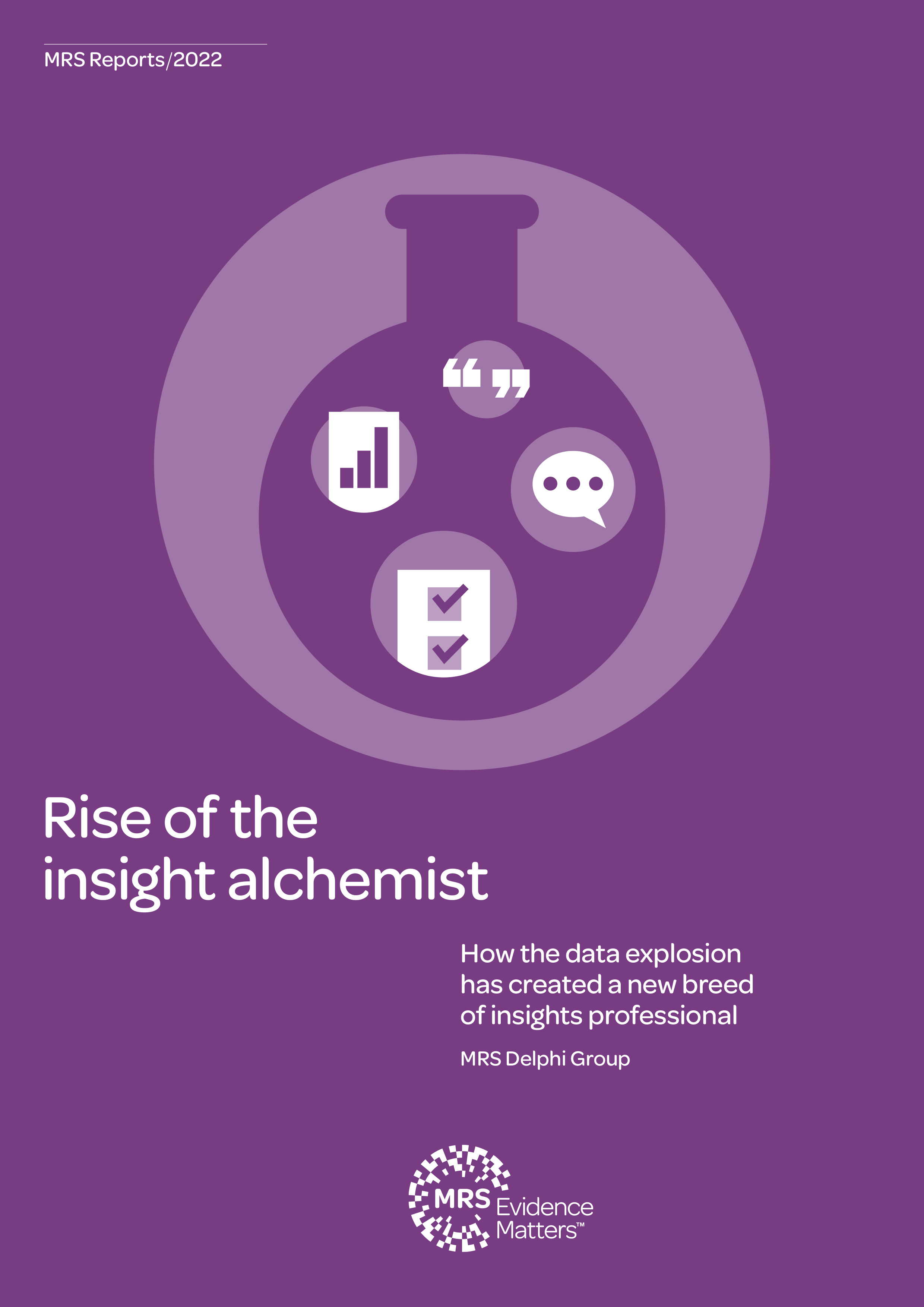Revealed! The 10 ingredients of insight alchemy
Here are the top ten recommendations from the free report ‘Rise of the Insight Alchemist', published by the MRS’ Delphi Group, which will help build a team that is at the leading edge of customer insight delivery.

Ingredient #1
Develop a strategy for data collection and aggregation
This calls for a clear-headed view of what it will be used for and why. As Unilever’s Alex Owens puts it: “The rise of data sources has led organisations to go into bit frenzy – ‘I must have it all and put it together under a single roof’ – without taking a step back and asking ourselves what are we trying to do? What do I have today and what can I get tomorrow? What can’t I get that I would like to? At least then you understand the types of data that you need in order to answer the overarching use case.”
Ingredient #2
Accept that all data is imperfect
As Owens says, we need to be bold and adapt to an imperfect situation: “Stop being so worried about precision. People are still too busy working out the statistical significance of the sample to make sure there’s representation. Those days have gone. Make the data as clean as possible and as accurate as possible, understand its biases, and understand what questions you want to ask of your data."
Ingredient #3
Understand the limitations of the data
It is stressed throughout the report that it is important to avoid the pitfall of assuming that one type of data is more robust and more efficacious than another, without giving due consideration. This was certainly supported by Prof. Smith from N/Lab: “I think you do have to be very cautious with behavioral data, as you do with self report data; each comes with a different sets of problems. I would never want to promote the idea that behavioural data is entirely robust or entirely reliable. If you want a full picture, you do have to do both.”
Ingredient #4
Recognise that insights about humans need humans to deliver them
In the report, Tesco’s Naomi Kasolowsky coined the term ‘humanly thoughtful’: “I think progressive insight teams have a degree of creativity about them and they’re very optimistic. They think about scenarios and the different ways in which things might play out. They’re thoughtful, but also they’re humanly thoughtful. You need that in your agency. You need that in your team. You still need the instinct and the creativity of people to come up with brilliant insights into why things are the way they are, and how we should respond to them.”
Ingredient #5
Adopt a test and learn attitude
Just as data will never be perfect, so the same applies to the way in which we build knowledge from the data. There is an understanding that these will be informed judgements – hypotheses – rather than absolute facts, and as such, the actions taken as a result of this are ideally more tentative in nature. We learn as much from applying the knowledge we derive from the data, using a test and learn style approach, as we did from the data itself: Here’s Kasolowsky again, “A critical part of how we make our decisions is through test and learn. So you can say, well, we did that and it didn’t work, or that bit worked, and this is why it worked, and then we need to do more of that. It just allows you to be much more robust and agile.”
Ingredient #6
Act as an advocate for different sources of data
It is key to embrace the possibilities of all data sources and, in particular, to restate the value of speaking to people to understand them, as highlighted by Kasolowsky: “I would encourage the industry to not be worried and defensive. There is a very important role [for research] that I think just needs to be rearticulated. To businesses that are maybe investing more in data analytics and less in traditional research, I think it’s an opportunity to restate the value of the industry and step forward.”
Ingredient #7
Be data agnostic
Spotify’s Mike Bowen says: “Help researchers better triangulate insights across data sources and methodologies so organizations can have more confidence in their insights and recommendations. They can help insights functions bridge the gaps between ‘what’ and ‘why’ to help practitioners paint a holistic picture of current and prospective customers.”
Ingredient #8
See the work as a journey
In the report, Reckitt’s Elaine Rodrigo points out that the work is never complete: “The journey to transform an insights and analytics organisation into one that is able to seamlessly connect different sources of data, while also being strategic business partners, can often seem daunting. When we look at the new skillsets that we need upskill ourselves in, like digital, data science, omnichannel or consulting skills, we might ask ourselves ‘where do we start first’? My advice to all of you is to ‘eat the elephant in chunks’. Do it in bite size pieces. Tackle one thing at a time, start small with something that is achievable, build the muscle and scale.”
Ingredient #9
Build a one team vision
Build a customer centric vision across the business to break down silos and create a single purpose. Foster an appreciation of the role of different teams and skills – from the technical to the intuitive – and what they bring to the insight process, and embed a shared objective to bring the customer and the business closer together.
Ingredient #10
Demonstrate leadership and strength of character
Being adaptable and confident, and less risk averse, in spite of change and unpredictability – these are the characteristics that all of today’s insight practitioners need in order to thrive. Bridge the gap between technicians and creatives in order to deliver insight that can transform the business – the C Suite is listening, so make sure you’re heard.
What ingredients are missing? We'd love to hear your view – just comment below.
You can read the free report ‘Rise of the Insight Alchemist’ here.

We hope you enjoyed this article.
Research Live is published by MRS.
The Market Research Society (MRS) exists to promote and protect the research sector, showcasing how research delivers impact for businesses and government.
Members of MRS enjoy many benefits including tailoured policy guidance, discounts on training and conferences, and access to member-only content.
For example, there's an archive of winning case studies from over a decade of MRS Awards.
Find out more about the benefits of joining MRS here.











0 Comments